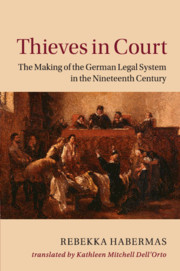Book contents
- Frontmatter
- Dedication
- Contents
- Acknowledgments
- Introduction: Questions Regarding Thieves, Reformers, Jurists, and Others
- PART I WHAT IS THEFT: QUESTIONS REGARDING THIEVES AND JURISTS – QUESTIONS REGARDING HONOR AND PROPERTY
- PART II HOW LAW IS MADE: EVIDENCE PRODUCTION
- PART III IN THE COURTROOM, OR WHAT IS LAW?
- Conclusion: The Making of the Modern Legal System – Thieves and Property
- Relevant Laws
- Bibliography
- Index
Conclusion: The Making of the Modern Legal System – Thieves and Property
Published online by Cambridge University Press: 18 November 2016
- Frontmatter
- Dedication
- Contents
- Acknowledgments
- Introduction: Questions Regarding Thieves, Reformers, Jurists, and Others
- PART I WHAT IS THEFT: QUESTIONS REGARDING THIEVES AND JURISTS – QUESTIONS REGARDING HONOR AND PROPERTY
- PART II HOW LAW IS MADE: EVIDENCE PRODUCTION
- PART III IN THE COURTROOM, OR WHAT IS LAW?
- Conclusion: The Making of the Modern Legal System – Thieves and Property
- Relevant Laws
- Bibliography
- Index
Summary
“A philosopher produces ideas; a poet, poems; a clergyman, sermons; a professor, compendia, and so on. A criminal produces crimes …. The criminal produces not only crimes, but also criminal law and thus also the professor who gives lectures on criminal law…. The criminal likewise produces the entire police and criminal justice system, thugs, judges, executioners, jurors, and so on ….”
Karl MarxThat theft, property, and law are connected is obvious – and yet, the connections are complicated, as is apparent in the descriptions just presented under the heading “faits divers.” I have sought to show some facets of the interrelationship of property, theft, and law. In the following pages, I will attempt to link these facets to each other, starting from Michel Foucault's deliberations, which were in part formulated almost simultaneously by Dirk Blasius. The purpose is to take another look at the question posed at the beginning of this study and still not yet conclusively answered: What are the characteristics of this new legal system, and what methods were used to “establish” justice anew with every theft trial in the nineteenth century? The objective is not, as in the previous chapters, to bring together further puzzle pieces in order to answer questions about what the individual steps of the process for establishing justice were and how they were related to contemporary and current interpretations. Instead, an attempt will be made to fit the individual pieces together more closely to form a complete picture, a picture that accents many factors differently from previous research but still, like that research, emphasizes the importance of openness to the public in the new legal system. Indeed, for the manner in which justice was established in the nineteenth century, the public played a central role. However, the public role did not function as the legal reformers had intended and as traditional legal historians have long believed.
THE DYNAMICS OF THE THEFT TRIALS
The German criminal historian Dirk Blasius was there from the start and dealt intensively, and not just tangentially as the French philosopher Michel Foucault did, with the question of the connection between property and theft. Still, both Foucault and Blasius came to strikingly similar interpretations of the connection between property and theft at approximately the same time, 1975.
- Type
- Chapter
- Information
- Thieves in CourtThe Making of the German Legal System in the Nineteenth Century, pp. 281 - 290Publisher: Cambridge University PressPrint publication year: 2016

